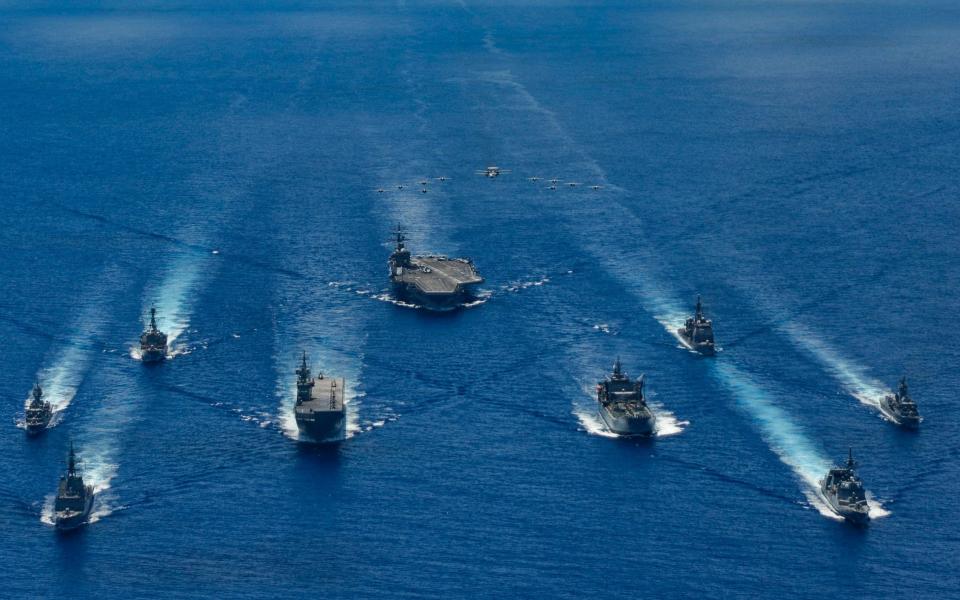Australia joins US and Japan for navy drills in the Philippine Sea as concerns grow over China

Five Australian warships are conducting military exercises in the Philippine Sea with the American and Japanese navies in a joint show of strength as tensions grow over China's maritime ambitions in the Indo-Pacific region.
An Australian Joint Task Group, led by HMAS Canberra, has joined the USS Ronald Reagan Carrier Strike Group and a Japanese destroyer for a "trilateral exercise" billed as an effort to improve co-operation in keeping international waters "free and open".
It comes on the back of maritime drills between a US Navy carrier strike group, led by USS Nimitz, and Indian warships near the vital Malacca Strait trading route, sending a strong strategic signal to Beijing against the backdrop of a violent India-China border standoff in recent months.
The military co-operation also coincides with a warning from Washington that America will step up its challenges to Beijing's territorial moves in the region.
Last week, Mike Pompeo, the US secretary of state, formally rejected "most" of China's maritime claims in the South China Sea.
"Strategic balancing against China is ramping up dramatically in the Indo-Pacific region," said Professor Rory Medcalf, the head of the National Security College at the Australian National University and author of the newly-published Indo-Pacific Empire, which outlines the power struggle between China and the US.
"The symbolism of these exercises is powerful," Prof Medcalf told The Telegraph. "It's a potent reminder that the combined navies of the quad – America, Japan, India, Australia – are more than enough to give China pause, and that Beijing's own confrontational behaviour has brought them together.
"It's a reminder of the cordon they could form if ever confrontation were to escalate. China simply cannot control the vast Indo-Pacific region over which its oil lifelines and quasi-colonial ambitions have spread – it needs to find a settling point before a crisis boils over."
Recently, China has sparked alarm with increasingly assertive moves in disputed territories of the resource-rich South China Sea, and experts have warned against Chinese dominance in a region where commercial shipping lanes are key to global trade and could be exploited for economic coercion.
Vietnam, Malaysia, the Philippines, Brunei and Taiwan all have claims over territory that Beijing maintains historic rights to, and concerns have grown over heavy Chinese investment in structures and facilities in the South China Sea, dredging through rocks and reefs to expand contested islands.
As the US has stepped up its freedom of navigation operations, China has bolstered its own military drills and last week deployed fighter jets to Woody Island in the Paracels, an archipelago also claimed by Taiwan and Vietnam.

On Sunday, Chinese state media reported that the People's Liberation Army (PLA) had also conducted live fire drills at an unspecified location in the South China Sea, launching more than 3,000 missiles at moving targets.
The South China Sea has become an increased source of tension between the US and China, who have simultaneously clashed over the coronavirus pandemic, trade issues, industrial espionage, human rights concerns in Xinjiang and Tibet and civil liberties in Hong Kong.
On Tuesday, Mark Esper, the US defence secretary, told the International Institute for Strategic Studies that US aircraft carriers in the South China Sea and Indo-Pacific were "not going to be stopped by anybody" and would continue to "assert international law" and defend the sovereignty of friends and partners.
Regular US freedom of navigation operations in the area have angered Beijing, which has maintained that America is provoking China by entering its sovereign territory.
China has also hit out at the UK for its plan to station its newest aircraft carrier, the HMS Queen Elizabeth, in East Asia. The £3.1 billion carrier is expected to conduct military exercise with the US and Japan early next year.
In a briefing with foreign media on Wednesday, Joseph Wu, Taiwan's foreign minister, said increased co-operation between allies on freedom of navigation to uphold international law was helping to support regional peace and stability.
"If the UK is interested in conducting freedom of navigation operations in the South China Sea, that is something that we would not oppose," he said.

 Yahoo News
Yahoo News 
